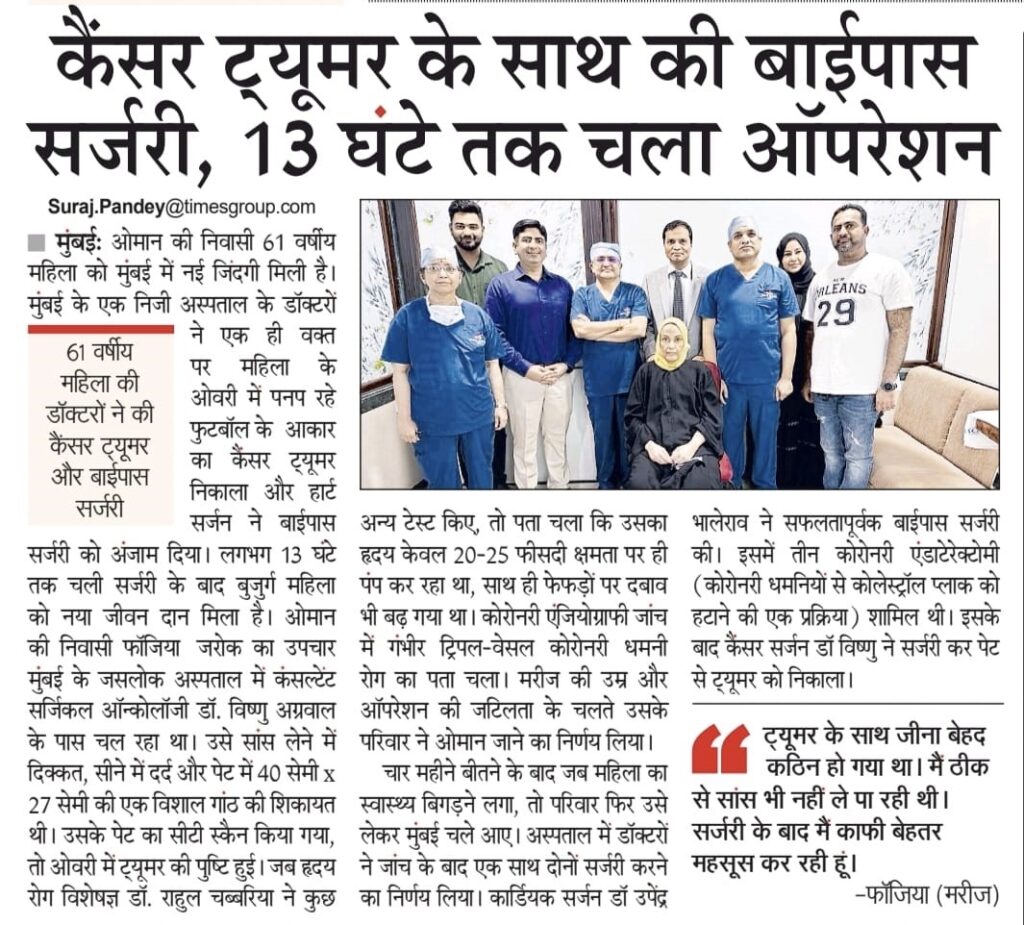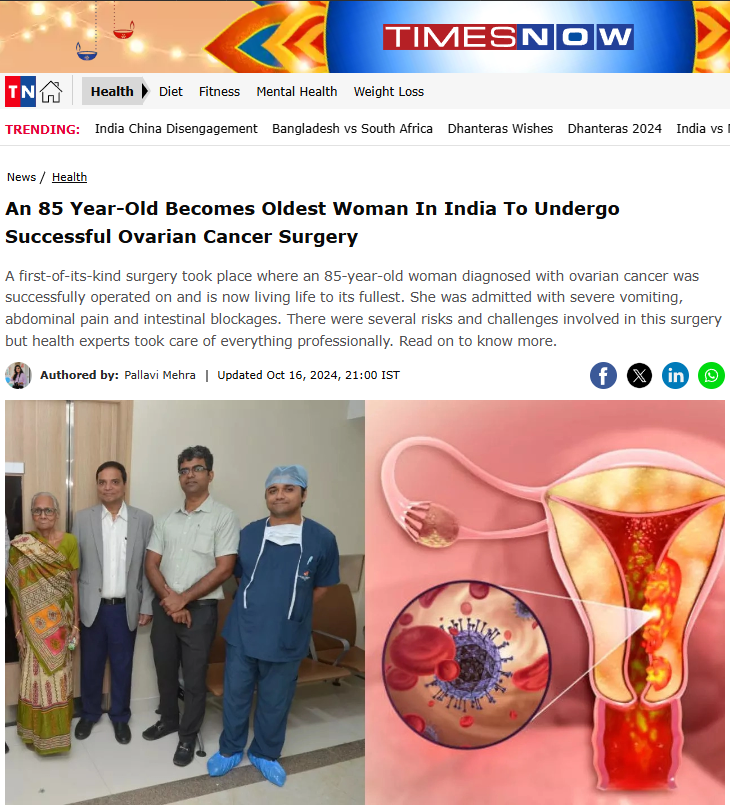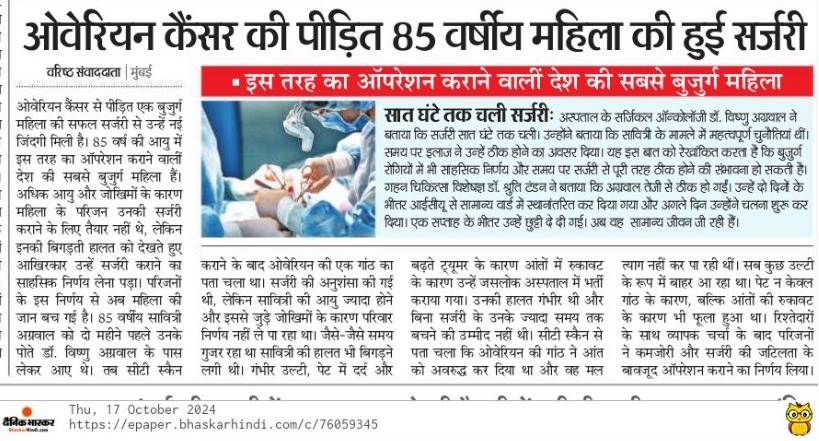Ovarian Cancer is a type of Gynaecological cancer that originates in the ovaries, a prime reproductive organ in females. The latest research also suggests that some sub-type of Ovarian Cancer originates from fallopian tubes. The female reproductive system contains two ovaries, one on each side of the uterus that produces eggs and female hormones. Ovarian Cancer normally affects women over 50, who have been through menopause. In over 20% of cases, it has affected the younger ones too. Ovarian Cancer diagnosed early has better chances of recovery. Many a time ovarian cancer does not produce any symptoms at an early stage hence sometimes remains undiagnosed at an early stage. |
Early diagnosis & treatment is key to win battle against Ovarian Cancer.
Dr. Vishnu Agarwal is a Trusted Ovarian Cancer Surgeon in Mumbai, India. He is known for relieving patient’s and their family from the anxiety and keeping patient’s interest at center throughout the treatment.


Snapshot of news article that appeared in Media
What Can Cause Ovarian Cancer?
Family History
Genetic Mutation
Obesity / Overweight
Older Age
Breast Cancer History
Colon Cancer History
Reproductive History ie either having no children or having them late
Use of Fertility drugs
Endometriosis rarely
Smoking
Use of Talcum Powder
Symptoms of Ovarian Cancer
Beginning time Ovarian Cancer rarely causes any symptoms but, in advanced stages may cause some specific symptoms.
Specific Symptoms
- Abdominal Bloating and Pain
- Unexpected Vaginal Bleeding
- Feeling full rapidly when eating
- Frequent Urination
- Pressure in Pelvis
- Back Pain
- Elevated Levels of the Protein CA-125
Non Specific Symptoms
- Fatigue
- Indigestion
- Nausea
- Loss of appetite
- Weight loss
- Breathlessness
Diagnosis of Ovarian Cancer
Most of the Ovarian Cancer is diagnosed at an advanced stage because it is hard to detect at an early stage.
In some cases, Ovarian Cancer is not detected during a clinical pelvic exam, so gynecological oncologists may advise following medical tests to investigate Ovarian Cancer.
- Pelvic exam
- Transvaginal Ultrasound(Sonography)
- Abdominal Ultrasound(Sonography)
- Positron Emission Tomography or Computed Tomography (PET-CT scan)
- Magnetic Resonance Imaging (MRI)
- CA-125 Test(Blood Test)
- Advanced Genetic Testing
- Diagnostic Laparoscopy
- Colonoscopy
- Biopsy
Types of Ovarian Cancer
Ovarian Epithelial Cancer( Primary Peritoneal Carcinoma)
Germ Cell Tumors
Sex Cord-Stromal tumors
Carcinosarcoma
Ovarian Sarcoma
Krukenberg Tumors are metastasis in ovary from other organs
Ovarian Cysts rarely
Ovarian Cancer Stages
Ovarian Cancer means cancer in ovaries.
Staging of Ovarian Cancer describes how far it has spread, growth, location, and which treatment is required according to diagnostic reports, tests, and scans.
The FIGO (International Federation of Gynecological Oncologists) and TNM (Tumor, Nodes, Metastases) staging for Ovarian Cancer are listed below.
Stage 1A – Tumor is found only in one ovary.
Stage 1B – Tumor is found in both ovaries.
Stage 1C – Tumor is found in one or both ovaries or fallopian tubes with any one of the following situation is true-
The tissue surrounding the tumor ruptures during surgery. or
The tissue surrounding the tumor ruptures before the surgery. Or
The cancer cells are found in washing fluid from the abdomen or pelvis.
Stage 2A – Tumor has spread from ovaries to fallopian tube or uterus or both.
Stage 2B – Tumor spreads to nearby organs in pelvic like bladder, colon, or rectum.
Stage 3A – Tumor has spread outside the pelvis to the lymph nodes or upper abdomen seen only with the microscope.
Stage 3B – Tumor is found in the upper abdomen that is 2cm or smaller in size.
Stage 3C – Tumor is larger than 2cm and spreads to lymph nodes in the abdomen.
Stage 4A – At this advanced stage, the tumor has spread throughout the body and it has been found in the fluid around the lungs.
Stage 4B – Tumor has spread inside the lungs, liver, lymph nodes, outside the abdomen, and other organs of the body such as skin, lungs, or brain.
Ovarian Cancer Treatment
Ovarian Cancer treatment depends upon the tumor size, stage, and whether you have a child in the future.
Ovarian Cancer treatment is done with a combination of surgery and following treatment.
- Surgery(Advanced Ovarian Cancer Surgery)
- Radiation Therapy
- Chemotherapy
- Hormonal Therapy
- Targeted Therapy
- Supportive (Palliative) care
Ovarian Cancer Surgery
Cytoreductive Surgery which may include all below components
Diagmostic Laparoscopy
Hysterectomy
Bilateral Salpingo-Oophorectomy (BSO)
Omentectomy
Bowel Resection
Lymphadenectomy(Lymph node dissection)
Appendix Surgery
Peritonectomy
Preserving Fertility is an option in some selective patients
Patients Review

My wife was his patient with ovarian cancer. He did a long surgery for almost 5 to 6 hours to ensure Residual Zero (R=0) of cancer cell in patient. He is also a colorectal surgeon which is an added advantage in many surgical conditions of the patient.
I appreciate his skill as an Onco-surgeon and wish him to be the one of best in the world. May Dr. Vishnu live long. With profound regards.
(The patient treated is an HOD & Professor of Gynaecology and a retired Military officer)






For More Information

Jalsok Hospital
PEDDAR ROAD, MUMBAI

Breach Candy Hospital
BHULABHAI DESAI ROAD, MUMBAI

Bhaktivedant Hospital
MIRA ROAD, THANE

Saifee Hospital
CHARNI ROAD, MUMBAI